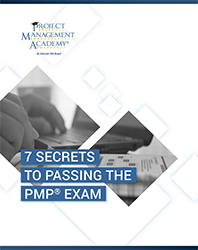
As many aspiring project managers already know, the field of project management is littered with certifications, master's programs, and technical training programs with varying degrees of relevance and significance. Project Management Institute (PMI), the world's largest association for the project management profession, seeks to consolidate these programs and provide a uniform standard of terminology and technical expertise through globally recognized certification. Even still, PMI's certification program is changing rapidly as the demand for project managers and the complexity of their tasks evolve. This article aims to alleviate the confusion associated with choosing the appropriate PMI certification.

7 Secrets to Pass your Exam for PMP Certification
Unlock your earning potential, download 7 Secrets to Passing the PMP Exam.
PMI currently offers eight certifications. For the purpose of this article, we will consider half of them to be general project management certifications and the other half to be specialty certifications. Typically, PMI's general project management certifications are designed to demonstrate mastery of a project manager's current career position and indicate to their employer a preparedness for advancement. PMI's specialty certifications attempt to demonstrate a higher understanding of particular project management roles and methodologies. Therefore, when considering a general project management certification, it is best for the candidate to consider where they are in their careers. For quick reference, each of the certifications mentioned will have a minimum level of experience or applicable area of expertise associated with their titles.
General PMI Certifications
Certified Associate in Project Management (CAPM)® - Entry Level
Project Management Professional (PMP)® - 3-5 years of experience
Program Management Professional (PgMP)® - 4-11 years of experience
Portfolio Management Professional (PfMP)SM - 8 or more years of experience
Specialty PMI Certifications
PMI Risk Management Professional (PMI-RMP)® - for candidates in risk management roles
PMI Scheduling Professional (PMI-SP)® - for candidates in project scheduling roles
PMI Agile Certified Practitioner (PMI-ACP)® - for candidates utilizing Agile methodology
Certified Associate in Project Management (CAPM) - Entry Level
The CAPM® is the only entry-level project management certification offered by PMI. So, while the content may be less technically involved than in other PMI exams, the CAPM certification demonstrates a fundamental understanding of the project management process and an overreaching commitment to the industry. Ultimately, it signifies to an employer that their employee is ready to take on larger projects with more responsibility. Therefore, this certification is best reserved for candidates with little to no project management experience looking to jump-start their young career.
Maintenance
To maintain the CAPM certification, a candidate must re-take the examination after a 5-year period.
Project Management Professional (PMP) - 3-5 years of experience
Simply put, the Project Management Professional® certification is the most widely accepted and distributed project management certification in today's market. More than 500,000 of PMI's 700,000 members have acquired it. Although obtaining the PMP® certification is not a prerequisite to work as a project manager, a PMP certification is often a justification for higher pay and is becoming a common requirement for positions in upper management. As a result, this certification is ideal for project managers in the prime of their careers seeking to maximize earning potential and advance further within their company.

Maintenance
To maintain the PMP certification, a candidate must complete 60 PDUs every 3 years.
Program Management Professional (PgMP)® - 4-11 years of experience
According to the A Guide to the Project Management Body of Knowledge (PMBOK® Guide), PMI's authoritative literature, a program is a collection of related, coordinated projects. If you are an established project manager working on multiple interrelated projects, this is the appropriate certification for you. Aside from demonstrating a proven ability to manage multiple related projects, the PgMP® certification is also designed to prepare you to manage the highest structural level of project management organization: portfolios.

Maintenance
To maintain the PgMP certification, a candidate must complete 60 PDUs every 3 years.
Portfolio Management Professional (PfMP)SM - 8 or more years of experience
At the time of this article, the PfMP℠ certification is actually still in a trial phase. However, should it be fully adopted, the PfMP certification can be considered the most advanced project management designation offered by PMI. It is reserved for individuals actively involved in managing portfolios. Portfolios, by PMI's definition, are compilations of programs designed to realize overall strategy and objectives.

Maintenance
At the time of writing, there are no established requirements for maintaining the PfMP credential.
PMI Risk Management Professional (PMI-RMP)® - for candidates in risk management roles
In response to the evolving complexity of projects, PMI developed the PMI-RMP® certification in order to identify and mitigate project risk. Although the breadth of the exam includes general project management knowledge, the certification was created specifically for risk management specialists seeking to distinguish themselves. If you are involved in a risk management role, consider the PMI-RMP credential.

Maintenance
To maintain the PMI-RMP certification, a candidate must complete 30 PDUs every 3 years.
PMI Scheduling Professional (PMI-SP)® - for candidates in project scheduling roles
Similar to the PMI-RMP certification, a PMI-SP® certification is a project management certification with a special focus on project scheduling. Again, while the PMI-SP certification does establish a fundamental understanding of general project management practice, it is suggested that only individuals specializing in project scheduling should consider the certification.

Maintenance
To maintain the PMI-SP certification, a candidate must complete 30 PDUs every 3 years.
PMI Agile Certified Practitioner (PMI-ACP)® - for candidates utilizing Agile methodology
The PMI-ACP® certification is a specialty project management certification designed for organizations that rely on Agile methodology. Agile methodology is a relatively new approach to project management, but has caught on through its iterative process as a means to effectively respond to changes in a project's development. If your company employs Agile in their business, this certification allows you to demonstrate a unique level of professionalism and commitment to this growing approach.

Maintenance
To maintain the PMI-ACP certification, a candidate must complete 30 PDUs every 3 years.
Choosing the right PMI certification can prove a daunting task, but the process is imperative in determining which skills to develop in order to meet your professional goals. With any luck, this article has helped narrow your search and will ultimately prove as a stepping stone in launching your project management career!


 New Horizons
New Horizons
 Project Management Academy
Project Management Academy
 Six Sigma Online
Six Sigma Online
 Velopi
Velopi
 Watermark Learning
Watermark Learning
 Login
Login





 New Horizons
New Horizons
 Project Management Academy
Project Management Academy
 Velopi
Velopi
 Six Sigma Online
Six Sigma Online
 Watermark Learning
Watermark Learning